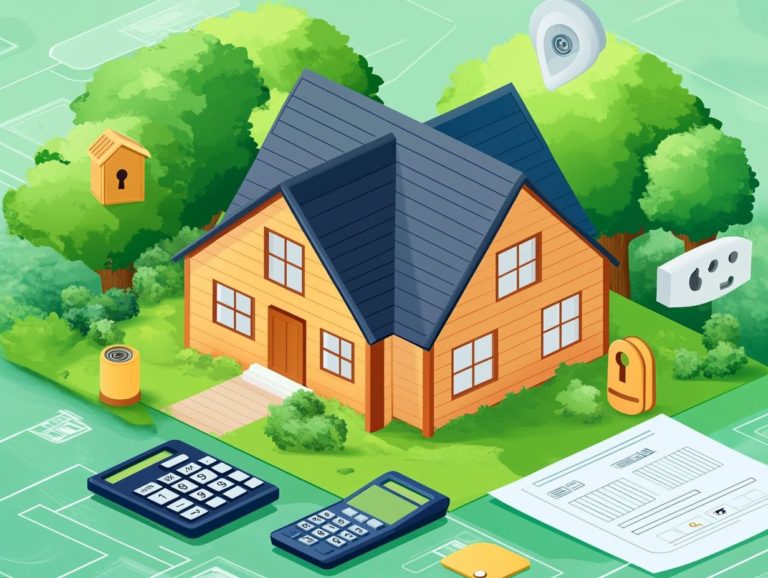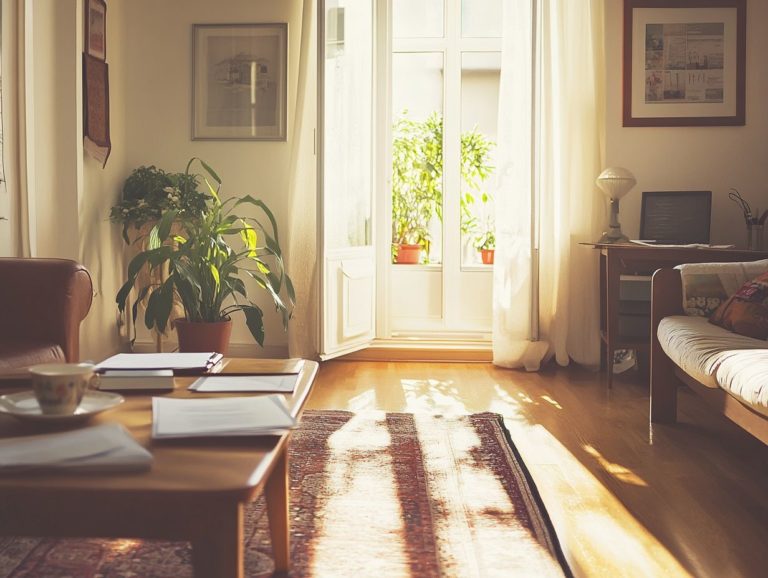What Happens if You Don’t Have Home Insurance?
Home insurance is more than just a financial safety net; it serves as important protection against unexpected events that could jeopardize your sanctuary.
This article delves into the essence of home insurance, illuminating why it is crucial for maintaining your peace of mind and the potential risks of navigating life without it. It also looks at other ways to protect your home and outlines the essential steps to take during emergencies, ensuring that you remain ever-prepared.
Continue reading to grasp the significance of protecting both your home and your future.
Contents
- Key Takeaways:
- Understanding Home Insurance
- Importance of Having Home Insurance
- Risks of Not Having Home Insurance
- Alternatives to Home Insurance
- What to Do if You Don’t Have Home Insurance
- Take Action Now
- Frequently Asked Questions
- What Happens if You Don t Have Home Insurance?
- Can I Be Forced to Get Home Insurance?
- What Are Some Common Risks That Home Insurance Covers?
- What Happens if My Home Gets Damaged and I Don t Have Insurance?
- Are There Any Other Benefits to Having Home Insurance Besides Financial Protection?
- What Steps Should I Take if I Don t Have Home Insurance?
Key Takeaways:
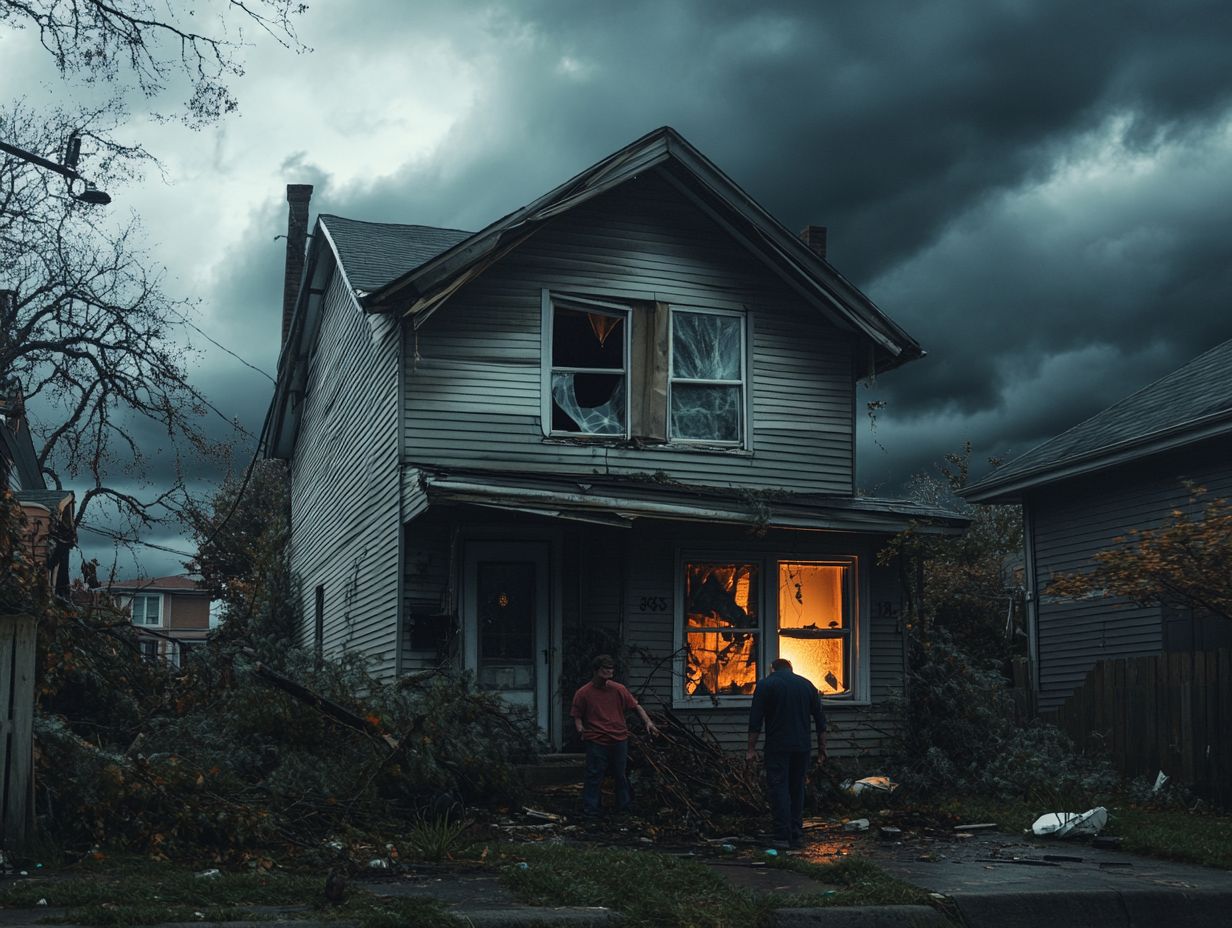
Not having home insurance can leave you vulnerable to financial losses in the event of damage or loss to your home. Without home insurance, you may have to rely on alternative ways to protect your home, such as self-insurance or government aid. In case of an emergency, it is important to have a plan in place and take immediate action to minimize potential damages and losses.
Understanding Home Insurance
Understanding home insurance is essential for homeowners. It provides vital financial protection against unexpected losses tied to property damage.
A standard homeowners policy usually encompasses a variety of risks, such as damages from natural disasters, theft, and legal claims if someone gets hurt on your property.
Mortgage lenders often mandate homeowners insurance as a prerequisite for loan approval, ensuring that both their financial interests and yours are well protected.
It’s crucial to recognize the different coverage options available and assess which ones align best with your unique needs and circumstances, including considerations like rebuilding costs and personal property coverage.
What is Home Insurance?
Home insurance, or homeowners insurance, is your safeguard against financial setbacks stemming from property damage, theft, and liability. This essential policy acts as a safety net, providing you peace of mind against various risks that could jeopardize your investment.
When you secure a homeowners policy, it typically covers damages from natural disasters like hurricanes, floods, and fires, allowing you to recover without facing overwhelming out-of-pocket expenses. Liability protection is often included as well, shielding you from claims related to injuries that occur on your property.
Moreover, you can choose from various coverage levels to suit your needs, such as:
- Dwelling coverage
- Personal property protection
- Additional living expenses
All of these elements work together to create a comprehensive financial shield that gives you power as a homeowner.
Importance of Having Home Insurance
Having home insurance is essential for homeowners. It offers invaluable financial protection and peace of mind against potential risks such as property damage, theft, and liability claims.
A comprehensive homeowners policy typically encompasses disaster coverage, safeguarding your investment from unexpected events, while also providing liability protection to ensure that any legal expenses related to accidents on your property are covered.
Protection and Peace of Mind
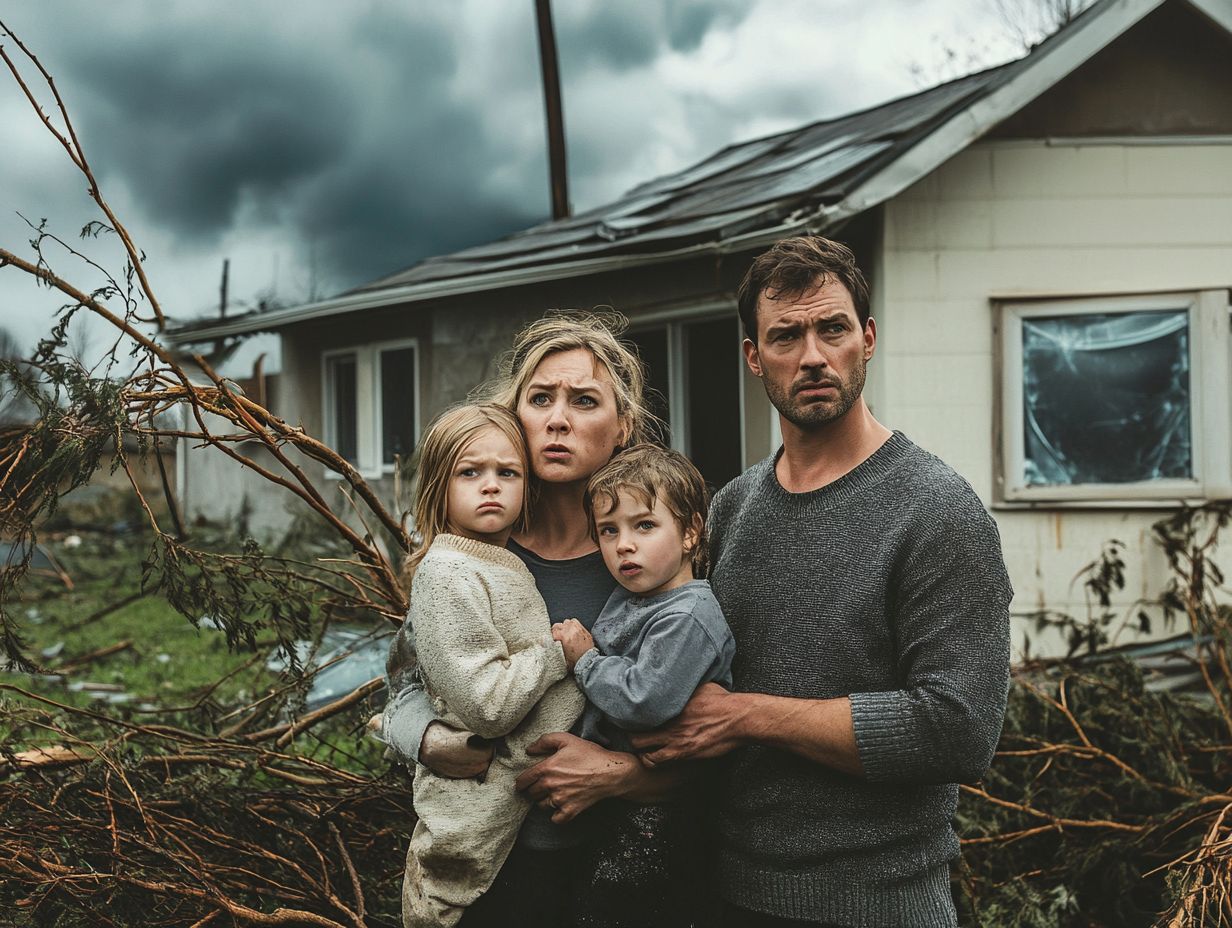
Homeowners insurance offers more than just physical protection for your home and property; it provides the peace of mind that your financial interests are well secured.
With adequate coverage in place, you can rest easier, reassured that you re protected against unforeseen events that could lead to hefty expenses, whether from natural disasters or theft. This protection extends to your personal belongings, ensuring that your cherished possessions are included in your safety net.
Embracing homeowners insurance helps alleviate the anxiety often tied to potential hazards, allowing you to focus on your daily life without the constant worry of financial setbacks. The emotional benefit of knowing there’s a safety plan in place gives you power, fostering a sense of stability and security that is truly invaluable.
Don t wait until it’s too late! Protect your home now to guard against potential disasters. Learn more about your options for home insurance today!
Risks of Not Having Home Insurance
Not having home insurance can leave you vulnerable to significant financial losses. You would bear the full burden of unexpected costs related to property damage or theft.
Without a solid homeowners policy, you risk facing high out-of-pocket expenses during disasters or accidents. This can lead to financial instability and stress.
If you have a mortgage, your lender might impose force-placed insurance, which is often more expensive and offers limited coverage. This adds another layer of financial strain.
Potential Financial Losses
The potential financial losses from forgoing home insurance can be staggering. These losses can include costly repairs for property damage and hefty liabilities from accidents on your property.
Consider the aftermath of a hurricane. Flooding and wind damage could lead to repairs costing tens of thousands of dollars. If you lack adequate coverage, you may face immediate repair costs and the burden of extended expenses for temporary housing.
The financial strain deepens when you factor in lost personal property or the need to replace essential items. In severe cases, the cost of rebuilding your home can skyrocket, leaving those without sufficient insurance struggling to fund construction.
This can result in a prolonged period filled with instability and uncertainty.
Alternatives to Home Insurance
While homeowners insurance is your primary line of defense in protecting your investment, there are alternative avenues that provide different layers of financial security.
Homeowners associations may offer some coverage for shared spaces, but they usually don t extend to individual homes. This creates a gap you should be aware of.
Additionally, you might consider options like a home equity loan for urgent repairs. This can act as a financial cushion during emergencies, but remember that these options come with their own risks.
Other Ways to Protect Your Home
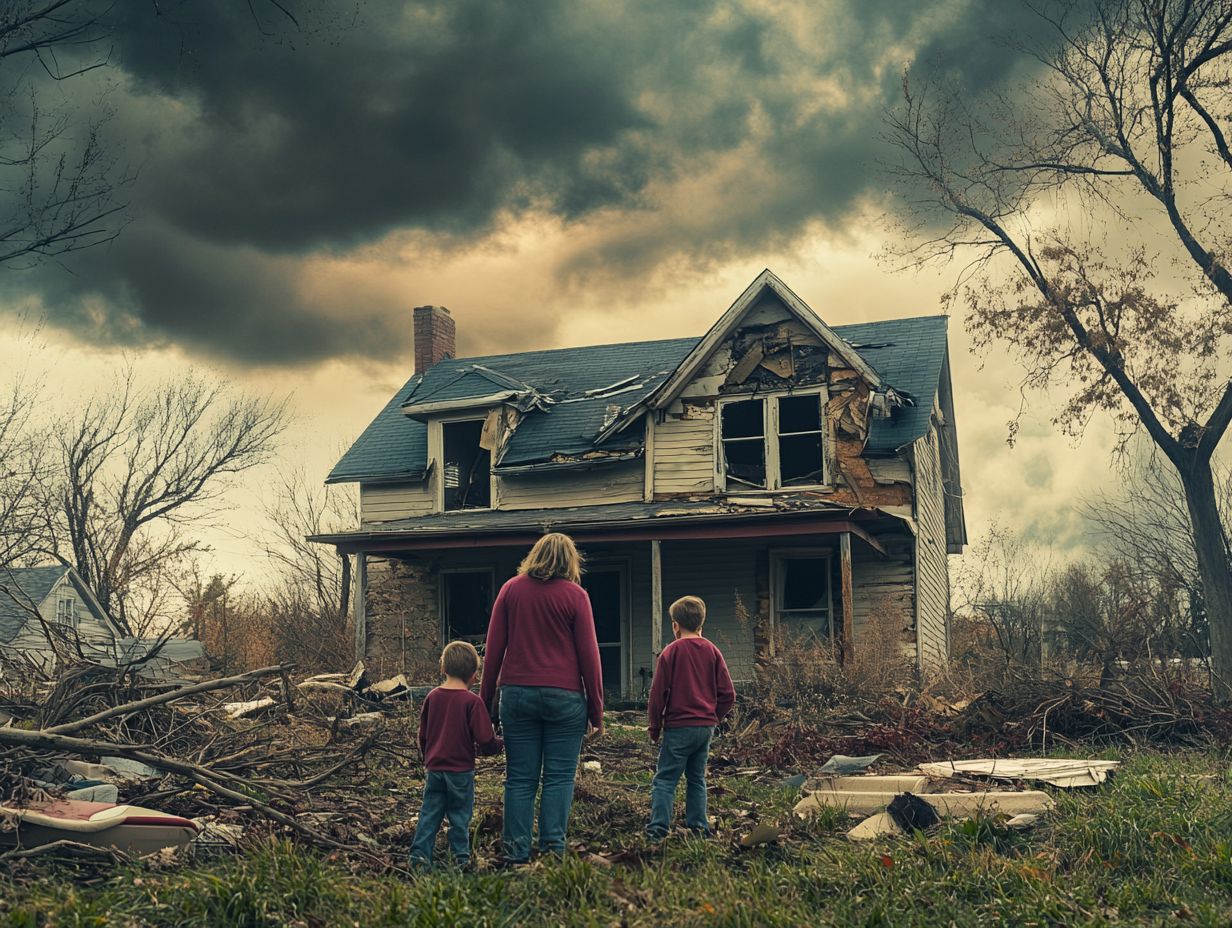
Besides homeowners insurance, there are numerous ways to safeguard your home through effective risk management strategies. These methods help mitigate potential losses from natural disasters and other hazards.
Regular maintenance checks allow you to identify and address potential issues before they escalate, ensuring the integrity of your property. Establishing a disaster preparedness plan tailored to local risks can significantly reduce panic and enhance safety during emergencies.
Beyond these proactive measures, explore creative coverage options like supplemental insurance for specific events or endorsements that extend the limits of your existing policy.
Utilizing financial products offered by banks and insurance companies can provide additional layers of security, allowing you to navigate uncertainties with greater peace of mind.
What to Do if You Don’t Have Home Insurance
If you find yourself without home insurance, it s crucial to act quickly to protect your property and financial future in an emergency.
Start by assessing the rebuilding cost of your home and exploring available coverage options. This ensures you have a solid financial safety net ready for any unexpected losses.
Engaging with insurance agents can provide valuable guidance on obtaining the right coverage without delay.
Steps to Take in Case of an Emergency
In an emergency, knowing the immediate steps to protect your family and personal property is vital. A comprehensive safety plan can truly make a difference when a crisis hits.
As a homeowner, prioritize creating an emergency kit filled with essential supplies such as food, water, first aid items, and flashlights to ensure you’re well-prepared. It’s also crucial to secure your personal property by learning to store valuable items properly and protect them from damage.
Consider liability protection to safeguard your finances against unforeseen incidents. Numerous resources are available to help you during a crisis. Local disaster response teams and organizations like the Red Cross offer valuable assistance, providing guidance, support, and essential supplies to those in need.
Take Action Now
Don’t wait until it’s too late. Assess your current insurance coverage today or reach out for advice if you lack insurance. Protecting your home and financial future starts with taking action now!
The Importance of Being Prepared
Being prepared for unexpected losses is crucial for homeowners, especially when it comes to using smart plans to handle risks and minimize potential damage.
By understanding the specific risks your property faces like floods, earthquakes, or wildfires you can take proactive steps to safeguard your investment.
This means crafting a detailed emergency plan that outlines evacuation routes, safe meeting points, and essential contact information. Regularly reviewing and updating this plan ensures everyone in your household knows exactly what to do in a crisis.
It’s important to keep in touch with your bank during emergencies. Regular check-ins about insurance policies and available support options will keep you informed and ready to tackle any financial challenges that may arise after a disaster.
Frequently Asked Questions
What Happens if You Don t Have Home Insurance?
If you don’t have home insurance, you risk facing major financial losses in case of damage or disaster to your home, making it crucial to understand why you need home insurance.
Can I Be Forced to Get Home Insurance?
In most cases, home insurance is not mandatory. However, if you have a mortgage, your lender may require you to have insurance as part of your loan agreement.
What Are Some Common Risks That Home Insurance Covers?
Home insurance typically covers risks like fire, theft, vandalism, and natural disasters such as windstorms or hail. However, it may not cover all types of natural disasters, so it’s important to review your policy carefully.
What Happens if My Home Gets Damaged and I Don t Have Insurance?
If your home gets damaged and you don’t have insurance, you’ll have to pay for all repairs and replacements out of your own pocket. This can be a significant financial burden, possibly requiring loans or using savings to cover costs. It’s crucial to understand what happens if you don’t pay home insurance to avoid such situations.
Are There Any Other Benefits to Having Home Insurance Besides Financial Protection?
Yes, home insurance can also provide liability coverage, which protects you if someone gets injured on your property and sues you for damages. Additionally, some policies may cover temporary living expenses if your home becomes uninhabitable due to damage.
What Steps Should I Take if I Don t Have Home Insurance?
If you currently don’t have home insurance, research and compare different policies to find one that fits your needs and budget. It’s also wise to start setting aside money for unexpected damages to your home. Consider speaking with a financial advisor to explore other options for protecting your home and assets.
Don t wait start preparing your home today!

